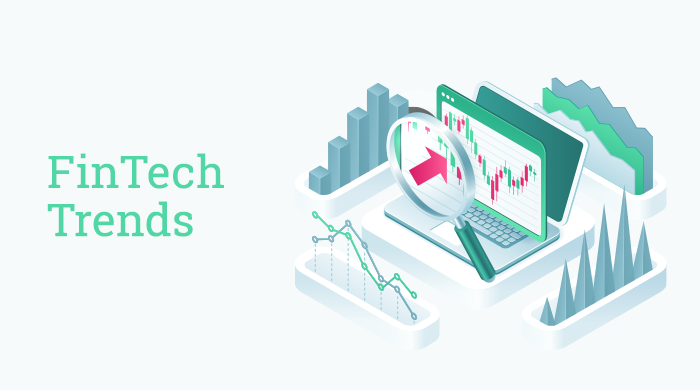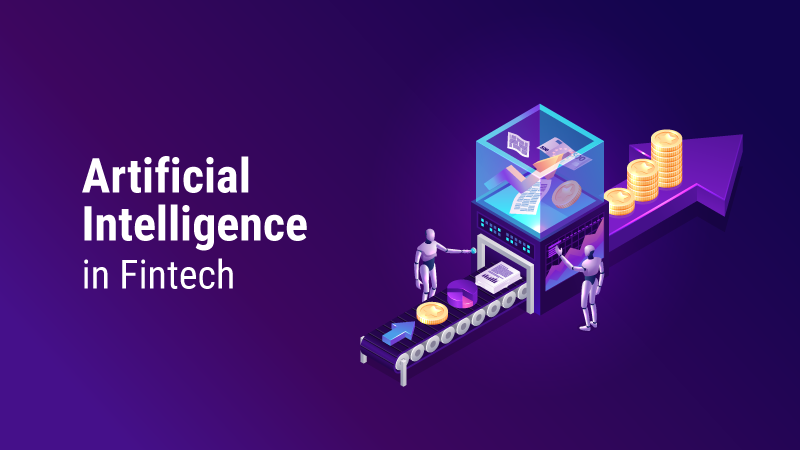Top 10 FinTech Trends to Keep an Eye on This Year

Financial Technology (FinTech), today, has become a revolutionary field in the global industry, encountering rapidly positive changes each year! FinTech has transformed countless business sectors ranging from banking and retail to financial advisory services.
Though the COVID-19 pandemic disrupted most industries across the world, it has brought brilliant opportunities for FinTech. The implementation of FinTech in financial institutions increased rapidly when the pandemic called for contactless transactions and social distancing. This has resulted in great transformations in the financial sector, and the assimilation of innovation has probably never happened at a greater rate.
Here are the top 10 financial technology trends that everyone would definitely be talking about this year.
Digital-only banking
The financial sector moves quickly when banks virtually provide global payments, Peer-to-Peer transfers, contactless MasterCard along with no transaction fees, and opportunities to exchange and purchase Bitcoin, Ethereum, and various other cryptocurrencies. Banking processes that offer these services to customers through online channels are increasingly revolutionized by digital-only banking. These are incredibly beneficial since, with the help of digital processes, no customer has to spend time visiting the banks physically, wait in a long line for banking services, and do a lot of paperwork. Due to the rise of digital-only banks, visits to banks have dropped by 36% between 2017 and 2022. Non-requirement of physical visits has been a boon during the time of the pandemic, and that has consequently resulted in the practice being accepted at an increasing number of banks. Other benefits of digital-only banking include fast bill payments, feasible cost management, real-time analytics, reset pins from home, and quick balance review.
Biometric security systems
Various digital financial services like mobile banking have become so popular due to increased internet usage and smartphones. Though this is a good practice, the increases in digital services raise a lot of security-related questions. Cybercrime is also another problem that keeps increasing in number every day. This is why every FinTech company should consider taking necessary security measures, and one way to do that is to add a biometric system to the list!
Biometric security systems provide customers confidence that all their personal and financial information is safeguarded, and since the introduction of various biometrics technologies like facial recognition and fingerprint identification is also a part of smartphones today, biometric security systems can be implemented to become a part of people’s everyday lives. However, in the years to come, contactless biometric solutions are believed to take over touch-based solutions.
RPA
RPA (Robotic Process Automation) is a technology that uses digital robots or programs (bots) to automate specific and rote tasks that humans normally do. Many organizations have already implemented similar systems to free up resources and increase accuracy. Many have also adopted the technology to automate back-end office processes like customer onboarding, security checks, reconciliation of payments, account maintenance, and more.
The most important advantage of RPA is that robots can complete each of these tasks quicker and more efficiently, allowing human employees to focus on much more complex and creative processes.
Blockchain
Though originally designed to focus on cryptocurrencies, blockchain technology has entirely changed the working of the FinTech industry today. With this technology, each transaction is ensured to be done in a secure and safe manner; blockchain decentralizes the verification process of a transaction, and the consequent increase in security of a transaction has meant that many banks and financial institutions have already adopted it and are currently leveraging its benefits!
Blockchain makes sure that all the information stores are secured end-to-end while there is minimum risk. It can also be implemented to ensure safe cross-border payments. These are a few reasons why blockchain is trending today.
Artificial Intelligence (AI)
Banks worldwide are planning to use Artificial Intelligence for many of their internal operations. According to Autonomous Research, AI is believed to reduce 22% of the operational expenses in a bank by 2030, meaning that banks will be able to save around $1 trillion simply by implementing AI for their operations.
Financial institutions can use AI to manage the increasing cyber-attacks by identifying financial threats and frauds. AI can also be made to work in a customer-centric manner by implementing algorithms that can record all interactions with utmost preciseness and accuracy. Through client service solutions like Chatbots, Artificial Intelligence has already shown its usefulness in financial intelligence – it is only a matter of time that financial institutions and banks adopt AI for other purposes.
Voice-enabled payments
The popularity of Siri and Alexa has shown how important voice technology is in our daily lives. However, these technologies can not only be used for helping people switch off their lights and reading their news but can also help them make easy payments. Reports have shown that there are over 3.25 billion voice assistants being used around the world. So, when more and more users start depending on their Smartphones for payments, voice technology might take over traditional payment methods and become the new payment solution.
Open banking
Open banking brings banks and Fintech together, enabling data networking across several financial institutions. It also ensures that the data released by financial service providers are standardized and secure, making information sharing easier among different authorized organizations online. It can also allow users to manage their financial accounts in a secure and accessible manner by offering them a consolidated view of their banking accounts. By making bank account management transparent and easy, open banking has the potential to improve the financial judgment for customers and has the potential to aid long-term wealth creation.
Virtual cards instead of plastic
The idea of using virtual cards instead of plastic is not new but is definitely getting popular this year. One of the major reasons why it is gaining popularity is high security; information cannot be stolen or copied easily unless a physical medium is present. Customers will also not have to worry about disposing of the cards once they expire.
Financial institutions can arm their staff with virtual cards to help them better manage expenses, and many organizations have already implemented similar systems in place.
Autonomous finance
Autonomous finance uses ML, AI, and automation to offer users a hassle-free experience on mobile portals. In this technology, the user is not required to give inputs directly. Instead, the customer can use the virtual banker created specifically for him on the portal. These unique virtual bankers will be able to manage and analyze the customer’s risks, portfolio, and investments. The AI algorithm will then generate the best savings and investment options for the customers, reducing the chances of any wrong judgment calls or human errors.
Cybersecurity
With the increasing FinTech solutions being implemented, financial institutions must not leave out efficient cybersecurity strategies. Cyber threats increase every day with increased online transactions, and digital processes and cyberattacks can create shared risks across systems. This is why financial institutions must make themselves cyber secure and implement effective cybersecurity strategies to protect themselves and their clients.
The FinTech revolution is only becoming stronger with newer and improved technologies. Therefore, avoid being left behind and explore these FinTech trends today!
Get Started with our FinTech Software Development ServicesBlogs by Category
AppForms Artificial Intelligence Blockchain Call Centers Chatbots Cloud Computing Data Management Design Digital Marketing Digital Transformation Enterprise Applications FinTech Insights LowCode Development Microsoft Mobile Apps News Office 365 Robotic Process Automation Security SharePoint Software Development Web ApplicationArtificial Intelligence in Fintech

2024-05-23 19:09:40